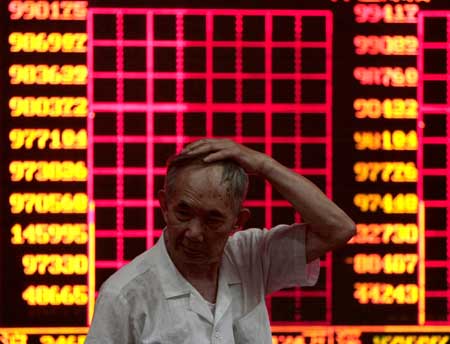Economy
New rules aid liquidity needs
By Chen Jia (China Daily)
Updated: 2010-09-13 09:34
 |
Large Medium Small |
An investor waiting for trading to start at a securities trading firm in Shanghai. Securities companies are allowed to sell subordinated debt with a maturity period from three months to as long as two years, according to a statement released by the China Securities Regulatory Commission last week. Experts say the rules may increase underwriting contracts over the next few months. Kevin Lee / Bloomberg
Securities companies allowed to sell some subordinated debts in China

BEIJING - Selling short-term subordinated debt following regulations approved by the China Securities Regulatory Commission (CSRC) can satisfy the need for liquidity and optimize the structure of assets and liabilities for domestic securities companies, said a report published by Guotai Junan Securities.
Securities companies are allowed to sell subordinated debt with a maturity period from three months to as long as two years, according to a statement released by the CSRC on Sept 8. Approved shareholders and institutional investors can directly lend money to securities companies, the statement said.
To sell the short-term subordinated debt is to satisfy the liquidity need in services such as bond and share underwriting businesses. The borrowed money can be used to replenish risk capital reserves. As such, the underwriting capability of securities companies will be improved, according to Guotai Junan's report.
"The rules can diversify financial channels for securities companies in the short term. It is good news for securities companies, especially for the small- to medium-sized ones," said Wang Mingfei, an analyst at Orient Securities Company Ltd.
China's stocks jumped back last Friday, capping a second week of gains for the benchmark index. The Shanghai Composite Index climbed 0.3 percent to 2,663.21 at the close on Sept 10, erasing a drop of as much as 1 percent earlier. It rose 0.3 percent last week. The CSI 300 Index gained 0.2 percent to 2,932.55.
However, the approved new regulations brought limited advantages for China's securities companies, which may not fundamentally lead a stock market recovery from the gloomy first half of this year, said Xie Peijie, an analyst in the securities industry from Central China Securities Holdings Co Ltd.
"They can only solve the temporary illiquidity problem for securities companies with limited reserves. In addition, the rules are restricted to work in underwriting and a few other prescriptive investment banking businesses," Xie said.
Additionally, lots of securities companies reduced stock trading fees in order to keep high trade volumes during the gloomy period. It intensified the fierce competition and squeezed their available profits, said Xie.
So far, China Merchant Securities, Huatai Securities and Northeast Securities are the three listed securities companies to have sold the subordinated debt in the domestic capital market. The first two securities companies have already redeemed their holdings, leaving only Northeast Securities with the subordinated debt.
Securities companies, especially the large ones issuing initial public offerings or refinancing for large amounts of capital, will be less affected by the new rules, according to Guotai Junan's report.
"The rules may increase underwriting contracts in the next few months but they may not obviously relieve the stock trading fee competition," Xie said.




